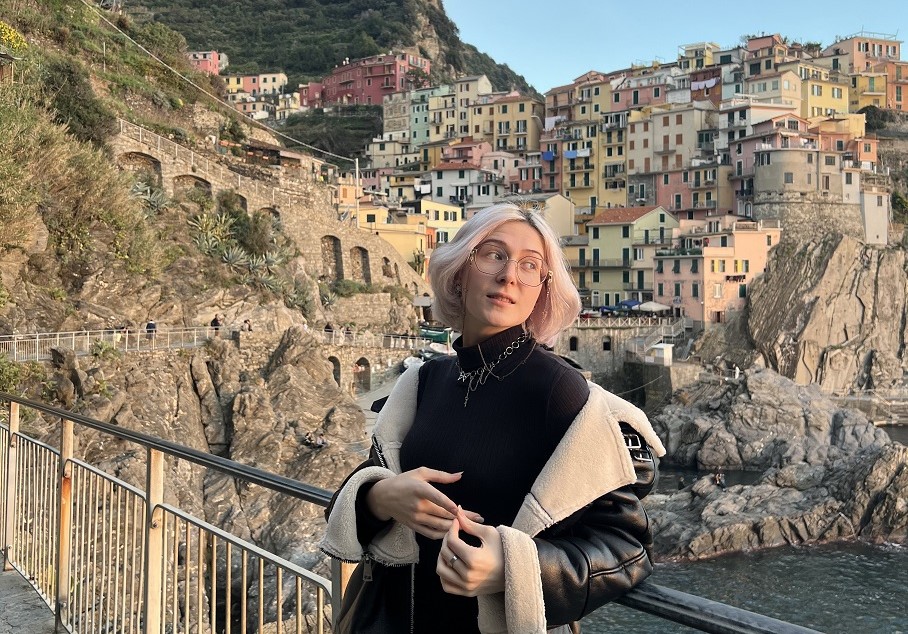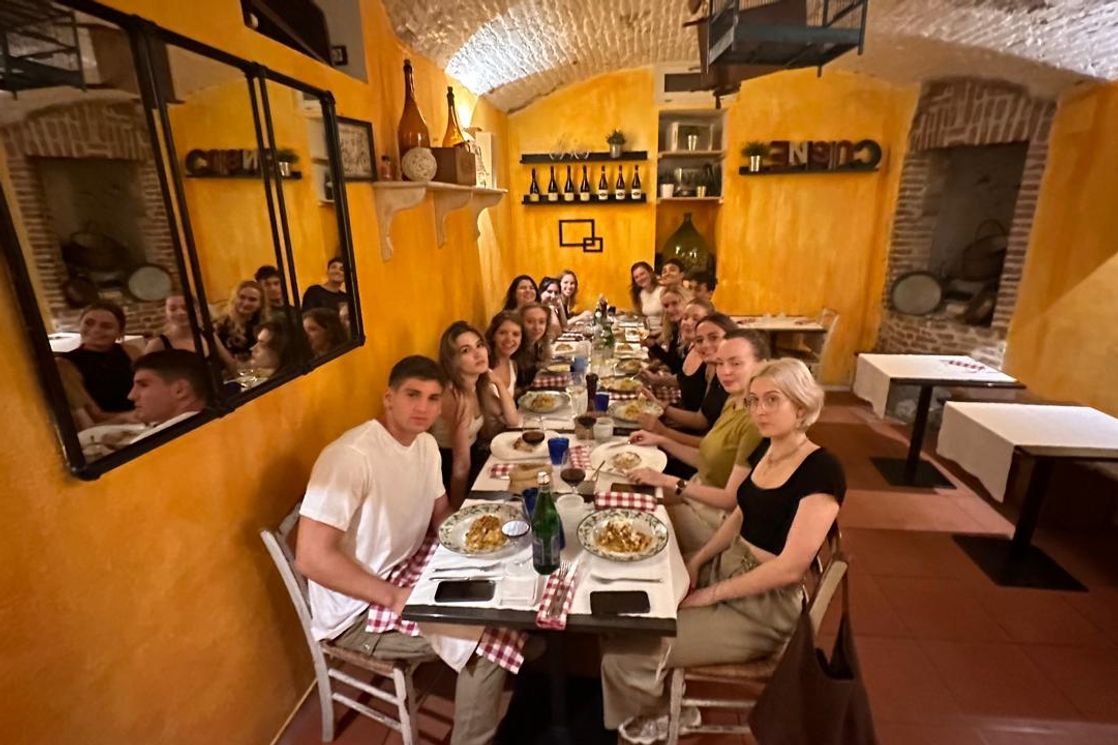‘Studying at the University of Bologna Is Very Different from How We Study at HSE’

Alina Pakhomova, a fourth-year student of the Bachelor’s Programme ‘Information Science and Computation Technology’ at the HSE Tikhonov Moscow Institute of Electronics and Mathematics (HSE MIEM), spent six months studying at the oldest university in Europe—the University of Bologna. She went to Italy as part of an academic mobility programme, and upon returning to Moscow, she shared her impressions of life and studying abroad, her leisure activities, new friends, and, of course, the famous Italian cuisine.
The University of Bologna and the Learning System
The University of Bologna is considered the oldest university in Europe, with notable alumni such as Dante Alighieri, Francis Petrarch, Nicolaus Copernicus, and Umberto Eco. Additionally, it is one of the top universities in Italy. So, when I saw that the University of Bologna was on the list of universities where HSE students could apply, there was no doubt: I applied only there. Besides, the other options did not quite fit my interests.
When you go on an exchange programme, you replace your courses with those offered by the host university, regardless of your major. As a fourth-year undergraduate, I ended up taking master’s-level courses because they were the best fit for credit transfer. Additionally, there are more master’s programmes taught in English than bachelor’s, which means a wider choice.
The semester runs from September to February. Exams, like at HSE, are held in autumn and winter, but unfortunately, in Italy, they take place both before and after New Year’s. After having a proper winter break at HSE, it was hard to cram and revise during the holidays in Italy.
Lectures and Practical Classes
Studying at the University of Bologna is very different from how we study at HSE. Classes last three hours, and sometimes two. Honestly, it is hard to stay focused after being used to sessions of an hour or an hour and a half. In Italy, it is crucial to review lectures afterward, engage deeply with the material, and take detailed notes; otherwise, you will not retain much. At HSE, seminars are very helpful for reinforcing the material, but the University of Bologna does not have them.
They have laboratory work in Italy, but unlike at HSE, where you usually complete the work at home and only ask questions or defend it during practical sessions, in Bologna, students carry out the tasks directly during the practical classes. It is rare that you need to finish it at home unless you did not manage to complete it in class.
My favourite course was probably ‘Artificial Intelligence in Industry’ because it focused on how things work in real life. Plus, the lectures were often delivered by guest lecturers from international companies. Incidentally, another common practice in IT programmes in Bologna is project-based exams. You submit one large project, and the grade you get for it is your final course grade.
Accommodation in Bologna
Finding accommodation here is tough. The university does not provide dormitories—formally, they exist, but getting a spot is almost impossible. Unless you have 1,000+ euros to spend on a room in a student co-living space (mostly occupied by exchange students from other European countries, like Erasmus students), you are in for a Hunger Games experience. Here, you do not choose your flat—the landlord chooses from a pool of students who want to rent it.
You will likely need to look for either a double (a bed in a shared room) or a single (a private room). Prices are usually 350+ euros and 500+ euros per month, respectively. Alternatively, you could team up with someone and rent a whole flat together.
Tip 1: Try to find accommodation through friends or students who went on exchange before you, and start looking in advance. Also, keep an eye on housing chat groups, as students often advertise rooms they are vacating and look for replacements.
Tip 2: Do not worry if you cannot secure a place in advance. You can rent temporary accommodation and continue your search after you arrive in Bologna.
What I Loved Most about Italy
It is easy to treat yourself to a mini-break or a trip to another city or country. For example, I flew to France, Denmark, and other European countries for weekend getaways, with one-way tickets costing just 15–20 euros (around 1,500–2,000 roubles). And the travel time was minimal.
As for Italy itself, it really helped me slow down. In Moscow, you are constantly rushing around, spending ages commuting on the metro. In Bologna, a 20-minute walk gets you wherever you need to be. It is much easier to meet up for a short stroll or a coffee, or to grab an Aperol Spritz after class.
How My Perspective on My Future Career Changed
Before studying in Italy, I thought I had a clear idea of the direction I wanted to pursue. My academic and professional background spans several areas: IT, marketing, and event management—a combination that makes me a great DevRel (Developer Relations specialist). But after my experience abroad, I realised I did not want to stop there. I now plan to continue my studies in a master’s programme. At the moment, I am particularly interested in product management in the high-tech sector.
Socialising and Extracurricular Student Life
Meeting new people and networking was one of my main goals for this trip. There were seven of us from HSE who went on this exchange, and none of us knew each other before arriving in Italy. But the experience of being on our own in a foreign country, trying to navigate countless new rules and bureaucratic procedures, really brought us together. In Moscow, we probably would never have crossed paths, and even if we had, we might not have become friends—we are all so different. But living abroad changes everything, and the circumstances naturally drew us closer. Interacting with people who are completely different from those you are used to in Moscow also changes you a lot.

In Europe, there is an organisation called ESN (the Erasmus Student Network), which usually has branches in every student city. It is run by students or recent graduates and organises various social events, meetups, trips, and travel opportunities with large discounts. They also have partner companies, so with an ESN membership card (which costs 10 euros), you can get discounts at restaurants and other businesses. For example, one partner is a low-cost airline that offers 10% discounts and free checked baggage for ESN cardholders.
I would not say everything is super well-organised, but there are just so many events. Most are designed to help people connect, find common interests, and enjoy their time together. One event I enjoyed was the Babel Nights, where people gather in different rooms to chat in specific languages. You can choose English, Italian, Spanish, French, or German—whichever you prefer—and join the corresponding room. You can also go to the theatre (with ESN discounts) or visit exhibitions together. There is truly something for everyone.
There are other student clubs, too. For instance, a group of students created a chat for hiking enthusiasts, and every Saturday, they organise a day hike. When I was leaving, they were expanding to create sub-chats for basketball and volleyball fans.
It is easy to meet people here, though one challenge is that many of the interactions feel quite superficial. Honestly, after a while, you can get a bit tired of endless small talk.
Local Cuisine and Favourite Dishes
Food in Italy is a topic in itself. What is interesting is not just which dishes taste the best, but how Italians view their food and dining rituals. Order a cappuccino after 12, share a pizza with someone, or get an autumn-themed pumpkin spice latte from Starbucks and you might as well start packing your bags and leave the country, as we often joked. Italians are deeply devoted to their gastronomic traditions and do not appreciate it when someone breaks the rules.
My personal favourites were pistachio croissants, cappuccinos, and lasagne. I am not even mentioning pizza and pasta because, honestly, I have had so much of them that I cannot bear the thought anymore. I do not understand how Italians manage to eat pasta every day. Once, we asked an Italian friend, ‘Do you ever have days when you do not eat pasta for lunch?’ His answer perfectly sums up Italian food culture: ‘Of course—but then I make sure to have it for dinner.’
See also:
‘Each Day Was a Challenge’: How an HSE University–St Petersburg Student Conquered China's ‘Ivy League’
Anastasia Stadnik, fifth-year student of the Bachelor's programme 'Asian and African Studies,' spent an academic year at Nanjing University thanks to the academic mobility programme. In this interview, she shared how studies in China's Ivy League were structured, when students had afternoon nap time, and how one could get a scholarship from the Chinese government.
A Dorm in a Palace, Tests without Grades, and Immersion in ML: Studies in Armenia under an HSE Mobility Programme
Alisher Yuldashov, second-year student of the HSE University Master's Programme 'Internet of Things and Cyber-physical Systems', went to the Russian-Armenian University of Yerevan under an academic mobility programme. Alisher shared his thoughts about the educational process, the programme curriculum, and his impressions of life in the capital of Armenia.
‘I Am Very Pleased with My Choice: HSE Is a Very Good University with Good Lecturers and Smart Students’
Many international students choose HSE University as their academic mobility destination. Some travel to Moscow to immerse themselves in a new culture, while others take online mobility options due to pandemic-related restrictions. HSE News Service spoke to three students about their exchange semester at HSE University.


